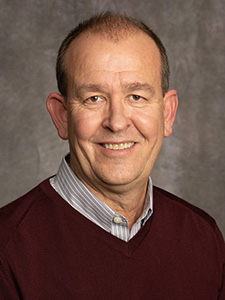James W. Hurrell – Professor and Scott Presidential Chair in Environmental Science and Engineering

Phone: 970-492-4041
Email: james.hurrell@colostate.edu
Research and teaching website
Education
- Ph.D. in Atmospheric Science – 1990 – Purdue University, West Lafayette, IN
- M.S. in Atmospheric Science – 1986 – Purdue University, West Lafayette, IN
- B.S. in Earth and Space Science – 1984 – University of Indianapolis, Indianapolis, IN
- B.S. in Mathematics – 1984 – University of Indianapolis, Indianapolis, IN
Career Overview
Professor James (Jim) Hurrell joined Colorado State University faculty in September 2018 as the Scott Presidential Chair in Environmental Science and Engineering and a professor in the Department of Atmospheric Science. Jim is a former director of the National Center for Atmospheric Research (NCAR) in Boulder, CO, where he was a Senior Scientist in the Climate and Global Dynamics Laboratory (CGD). He is also the former Chief Scientist of Community Climate Projects in CGD, which includes the Community Earth System Model (CESM), and a former director of CGD and the NCAR Earth System Laboratory. Jim spent a year as a visiting scientist at the Hadley Centre for Climate Prediction and Research in the U.K. Jim’s research has centered on empirical and modeling studies and diagnostic analyses to better understand climate, climate variability and climate change. He has authored or co-authored more than 100 peer-reviewed journal articles and book chapters, as well as dozens of other planning documents, workshop papers and editorials. Jim has been extensively involved in the World Climate Research Programme (WCRP) on Climate Variability and Predictability (CLIVAR), including roles as co-chair of the Scientific Steering Group (SSG) of both U.S. and International CLIVAR, Chair of the Scientific Organizing Committee for the WCRP Open Science Conference (2011), and membership on several other CLIVAR panels. He is currently a member of the Joint Scientific Committee of WCRP. Jim also has served the International Geosphere-Biosphere Programme (IGBP) as a member of the Global Ocean Ecosystem Dynamics (GLOBEC) SSG and the CLIVAR-PAGES (Past Global Changes) working group. Jim has been involved in assessment activities of the Intergovernmental Panel on Climate Change (IPCC) and the U.S. Climate Change Science Program (CCSP). He has served on several National Research Council (NRC) panels, and he has provided briefings and testimonies to both the U.S. Senate and the House of Representatives on climate change science.
Teaching Interests
- Global climate change
- Atmospheric dynamics
- General circulation
- Synoptic meteorology
- Geoengineering
Research Interests
- Global climate change
- Natural climate variability
- Seasonal-to-decadal climate predictability
- Geoengineering
Professor Hurrell’s personal research has centered on empirical and modeling studies and diagnostic analyses to better understand climate, climate variability and climate change, with an emphasis on the mechanisms, predictability and impacts of leading patterns of climate variability. He is especially interested in naturally occurring variations in climate on decadal timescales, and the predictability of those variations. The indisputable evidence of global warming, and the knowledge that surface temperatures will continue to rise over the next several decades under any plausible emission scenario, is now a factor in the planning of many governments, businesses and socio-economic sectors for which weather and climate sensitivity and vulnerability are high. On the timescale of a few years to a few decades ahead, however, regional and seasonal variations in weather patterns and climate, and their corresponding impacts, will be strongly influenced by natural variability. Decision makers in diverse arenas thus need to know the extent to which the weather and climate events they are seeing are the product of this natural variability, and hence can be expected to reverse at some point, or are the result of potentially irreversible, forced anthropogenic climate change. It is a central challenge of climate science to predict such regional-scale climate variability and change over timescales from seasons to decades.
Research Sponsors
- NSF
- NOAA
Professional Awards and Honors
- University of Indianapolis, Distinguished Alumni Award (2016)
- Fridtjof Nansen Memorial Lecture (2011)
- Fridtjof Nansen Medal, Norwegian Academy of Science and Letters (2011)
- Fellow, American Geophysical Union (2010)
- Fellow, American Meteorological Society (2006)
- Purdue University, College of Science Distinguished Alumnus Award (2006)
- Thomson-ISI Highly Cited Researchers (first time in 2004)
- Purdue University, Outstanding Alumnus Award, EAPS (2004)
- American Meteorological Society, Clarence Leroy Meisinger Award (2001)
- University of Indianapolis, Distinguished Alumnus Award, School of Science (2001)
- Fellow, Royal Meteorological Society (2000)
- NCAR, Outstanding Publication Award (1997)
Professional Positions
- Colorado State University
- Scott Presidential Chair in Environmental Science and Engineering (2018-present)
- Professor, Department of Atmospheric Science (2018-present)
- National Center for Atmospheric Research (NCAR)
- Director, NCAR (2013-18)
- Director, NCAR Earth System Laboratory (2011-13)
- Chief Scientist, Community Earth System Model (2009-11)
- Director, Climate and Global Dynamics Division (2003-07)
- Senior Scientist, NCAR (2003-18)
- Scientist III, NCAR (1998-2003)
- Scientist II, NCAR (1994-98)
- Scientist I, NCAR (1991-94)
- Visiting Scientist, NCAR (1990-91)
- Hadley Centre for Climate Prediction and Research
- Visiting Scientist (1999)


